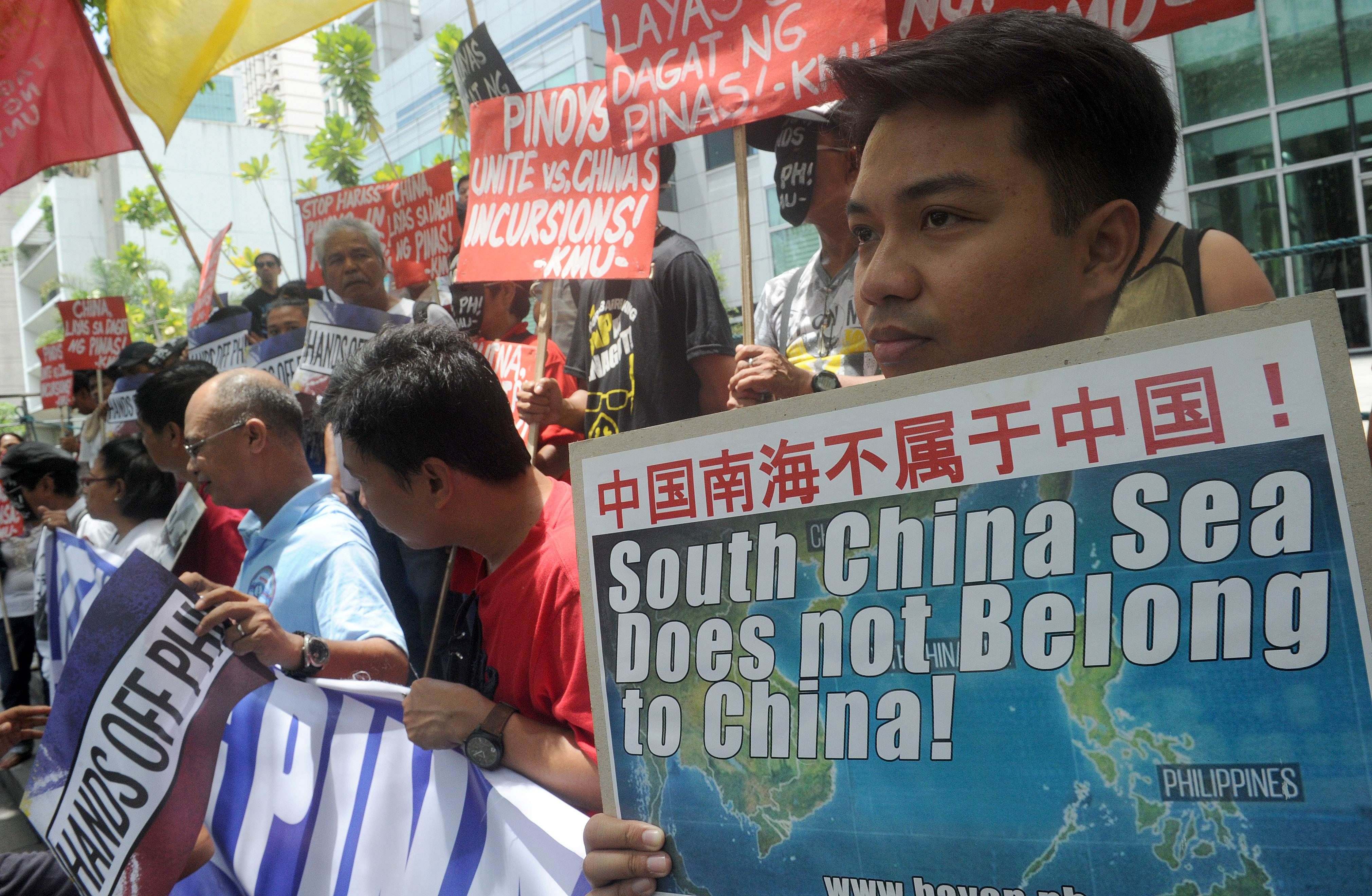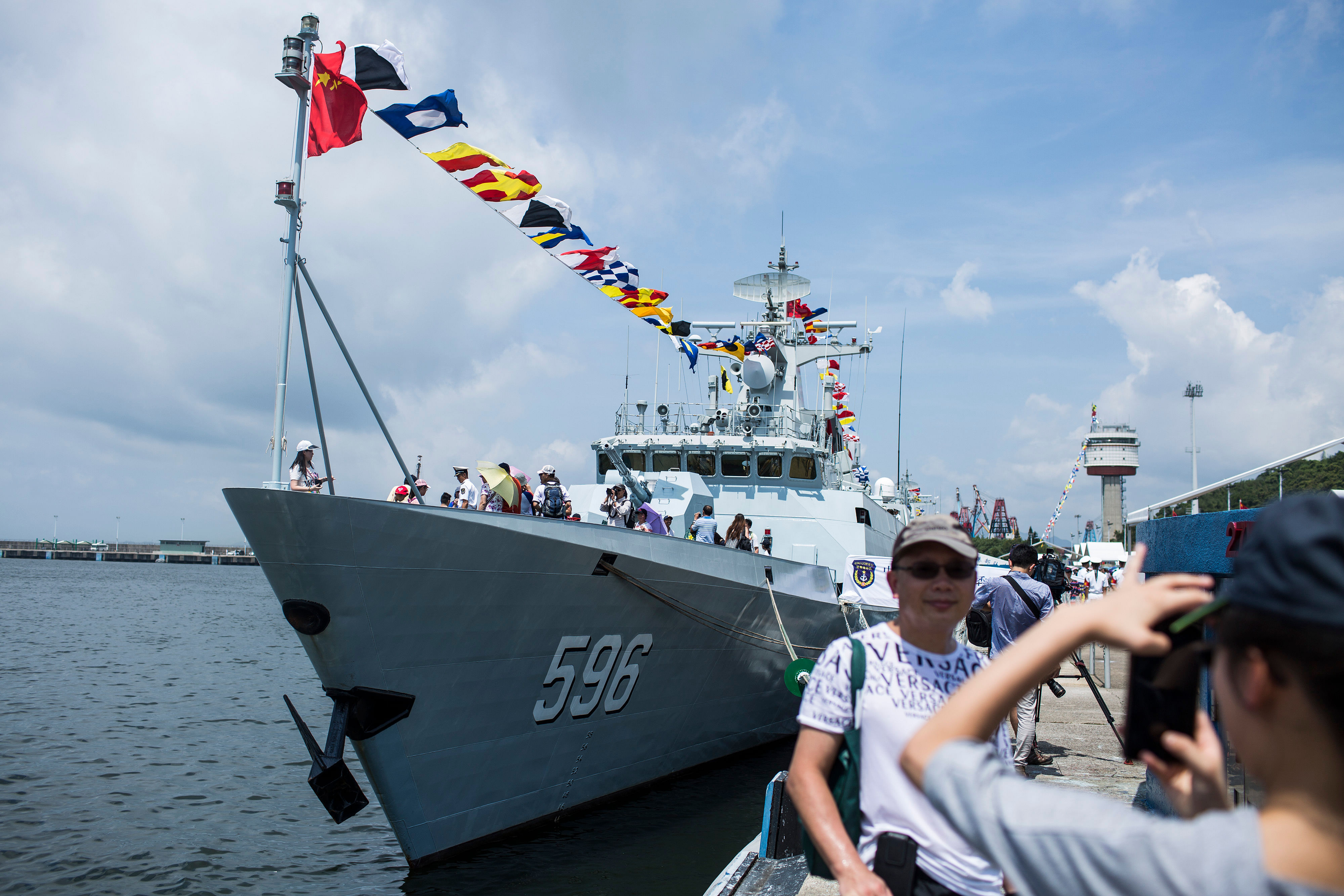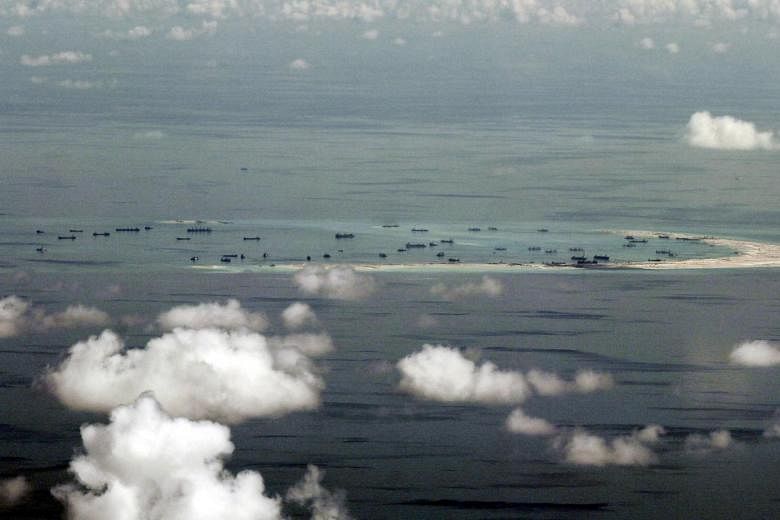1. Other Spratlys claimants are watching Philippines fight
Legal and historial arguments will be key to the final outcome
Ma. Ceres P. Doyo
Philippine Daily Inquirer/ANN

Nations with or without a stake in the West Philippine Sea's (South China Sea's) Spratly islands, shoals, banks, cays, reefs and rich fishing grounds must be watching the Philippines' power team argue at The Hague against China's encroachments in the area.
Watch us fight, watch us claim what is ours, not through brute force and size but through legal and historical arguments.
China is claiming "indisputable sovereignty" over the Spratlys and its waters. It is hurriedly putting up structures on its newly created manmade islands in disputed areas that are claimed wholly (by China) or partly by several Southeast Asian nations plus Taiwan. It is even claiming shoals that are right smack inside Philippine territory.
The Philippines is the David to China's Goliath. The Philippines is an upstart boldly going to an international court despite China's refusal to participate and its preference for some sort of bilateral talks where it can stare us down. So to The Hague we have gone by our lonesome while the other Spratlys claimants (Brunei, Malaysia, Vietnam and Taiwan) have chosen to watch quietly. Our victory can be their victory against a bully. I'd like to think that they are not as passive as they seem.
We know we are not alone. While we are not spoiling for a fight, we are not the kind to cower in fear and let go of our claims just like that. We don't grab territories, but we do not let anyone grab what we believe are ours. Might does not mean right. And we will give the mighty a fight.
In a magazine series on the Spratlys years ago and in a recent column, I quoted extensively the paper "The Philippine Claim to the Spratly Islands Group" written by the late law professor Haydee B. Yorac in the Philippine Law Journal. Yorac's piece was part of a larger technical work which focused on claims to territory and problems of delimitation of maritime boundaries in international law which had to do with the Philippines' claim to the Spratlys.
I had already written about the Philippines' claim as Yorac explained in her paper. What about the claims of the other countries?
According to Yorac, Vietnam also claims historic title to the islands but its claims can only be traced to as far back as 1927, when the French government sent a ship on an expedition. Two more expeditions followed, after which a French flag was planted in the area. The French government incorporated six groups of islets in a Vietnamese province, which provoked protests from China and Japan.
In 1938, the Indo-China Meteorological Service built a weather station on one of the islands. But questions arose: So, were these the only basis for their present claim?
This much I learned when I interviewed Vietnamese embassy personnel years ago: Vietnam does not recognize the right of discovery and first occupancy. It asserts that occupation by private individuals will not entitle their country to sovereignty as only the state can be a title holder. This is perhaps Vietnam's argument against Tomas "The Admiral" Cloma's claim on behalf of the Philippines, about which I had also written.
Vietnam reasons that in the 17th century, the Spratlys (and the Paracels as well) were already under its effective and continuous occupation until China invaded the islands. The French colonizers later administered the islands and drove out the Chinese forces after World War II.
Vietnam, which was occupying the most number of islands in the Spratlys (Truong Sa) in the 1990s, had supported its claims by invoking the principle of effectivity-"effective occupations and effective, continuous and peaceful exercise of state authority."
While Vietnam's precolonial claim needs scrutiny, its invoking the French expedition could run aground. Yorac asked then: "Did the French expeditions in 1927 and 1930 redound to the benefit of Vietnam?"
China claims that people from its Hainan island have been in the Spratlys since ancient times. Vietnam disputes this, saying that China had never administered the islands effectively and continuously in the past, and that other peoples-Vietnamese, Malays, Persians and Arabs-had made voyages to the areas. Complicating the Chinese claim is the "two China" reality.
Taiwan occupies Itu Aba, the biggest island in the Spratlys. Will China seize this in the dead of night?
Malaysia bases its claim on the concept of exclusive control over the continental shelf. Its official map now covers part of the Spratlys. In 1988, 48 Filipinos fishing near the Commodore Reef claimed by Malaysia were detained by Malaysian authorities. The reef is where Malaysian and Philippine claims overlap.
The Filipino fishermen's detention posed a diplomatic problem at that time, and President Corazon Aquino had to plead for their release. The men were later released but by then one had already died in prison.
In the early 1990s, Malaysia put up a resort hotel on Swallow Reef (Terumbu Layang Layang), which is in a contested area. I remember this. It was seen as Malaysia's show of sovereignty and expansion of its continental shelf. However, I learned that reefs, on their own, cannot sustain human life and therefore cannot be taken as basis for measurement.
Oil-rich Brunei's claim is similar to that of Malaysia. So far Brunei has not tried to occupy any reef or island.
Maybe the Philippines can learn a lesson or two from this: When Pugad island, the Philippines' ninth island, was abandoned about two decades ago, the Vietnamese moved in with lightning speed.
May our power team at The Hague be a winning team.
2. Submarines for what? Thailand faces no maritime threats
Security threats, if any, in the region at present are non-traditional ones
Supalak Ganjanakhundee
The Nation/ANN

Thailand definitely needs equipment to build up its military strength - but submarines are not the best solution to achieve this objective since the country currently faces no conventional maritime threat.
Of course many Asean countries - like Indonesia, Malaysia, Singapore and Vietnam - have a number of submarines to protect their territorial waters and even Myanmar plans to acquire some. But, are these neighbours a true maritime threat to Thailand?
Indonesia, which has two type-209 submarines and plans to acquire a dozen in the near future, is not a case for consideration as the country is far away and has no maritime conflict with Thailand. There is no sign or historical record to suggest that Indonesia has any plan to attack Thailand.
Singapore is among countries in the region which has military strength and modern defence equipment. The city-state has two Archer-class and four Challenger-class submarines, but nobody in the Thai Navy or Army imagines that Singapore would become a military threat to Thailand. Singapore conducts military exercises in Thai territory regularly - but Thai people and the elite have never expressed any distrust about them.
Malaysia, which has an overlapping area also claimed by Thailand on the floor of the Gulf of Thailand, has two Scorpene-class submarines. The two countries have had border difficulties in the past due to violence in the deep south, but it is clear to Thai security agencies that Malaysia is not a maritime threat to Thailand. Relations between Thailand and Malaysia are mostly cooperative, rather than conflict.
Among the Thai military elite, Vietnam is seen as having the potential to pose a maritime threat to Thailand due to overlapping territorial areas in the Gulf of Thailand and competition for influence over the region. Historically, Thailand and Vietnam have competed over the Mekong basin for hundreds of years.
But, history has proven for many years that Hanoi has never had any intention to attack Thailand - although it remains distrusted by the Thai elite, notably the military.
It is true that Vietnam is building up its maritime power these days. Hanoi has six Kilo-class submarines, including some yet to be delivered. It is no secret that Vietnam is in the process of acquiring 50 anti-ship and land attack 3M-14E Klub supersonic cruise missiles for its burgeoning fleet of SSK Kilo-class diesel-electric submarines.
However, the Thai elite knows very well that Vietnam built up its maritime strength because of conflict in the South China Sea, based on tension with its giant neighbour China, which has the world's third largest submarine fleet. Vietnamese submarines cannot be regarded as a threat to Thailand. On the contrary, if Thailand purchased submarines from China, it could pose a challenge to Hanoi since Vietnamese leaders might construe that Thailand would stand with Beijing if they were really in dispute.
On the western coast, India has 15 submarines while immediate neighbour Myanmar has no significant maritime power, let alone submarines. From a security perspective, it is useless for India to pose any threat to Thailand, while New Delhi wants it to be a major bridge to Southeast Asia.
Countries in this region both inside and outside Asean have reached consensus that there will be no major conventional warfare in the near future. Perhaps even half a century from now, countries in the region would not consider waging any wars against each other.
Security threats, if any, in the region at present are non-traditional ones, such as terrorism, piracy, smuggling, trafficking and natural disasters.
It is possible that Thai fishing boats could be sunk by the Indonesian Navy and Coastguard forces, as they illegally fish in the Java and Sumatra seas. Rohingya and Bangladeshi migrants are also being trafficked in the Indian Ocean to disembark on the Thai shore. Meanwhile, earthquakes and volcanic eruptions in Indonesia might create disaster in Thai territorial waters, both in the Gulf of Thailand and Andaman Sea. All are possible.
The Navy might be commissioned to respond to such threats and need to provide humanitarian assistance for disaster relief. Navy equipment would be utilised for sure, but having submarines for such purposes is not suitable and too expensive.
And to cap it off, a smart navy would never use combat submarines to catch fish.
3. Koreans should stop being too presumptuous, audacious
The nation should take advice from experts and professionals so that results are not fatal to national interest
Kim Seong-kon
The Korea Herald\ANN

Sometimes we are presumptuous and foolhardy enough to take the liberty of assuming and interpreting things in our own way. Before speculating, however, we need to double check whether our assumption is right. Unfortunately, many people just do what they think is right without prior confirmation.
When my book "Literature and Film" was published in 1996, I was left embarrassed and dumbfounded. The book came out with the English title "Literature and Movie." The book cover designer assumed that it was the right title and audaciously printed it on the front cover. Even though I was in the States at the time, he could have easily reached me either by phone or email. Yet he did not bother to ask for my opinion and as a result committed an unpardonable mistake. On seeing the awkward title, I despaired because readers would definitely assume it was I, not the designer, who came up with that awkward title. I can imagine them laughing at my poor English, "Shame on him! How could this guy become a professor of English?"
In another book of mine, "Hollywood: A Mirror of 20th Century Culture," I included a chapter on the celebrated Stanley Kramer movie, Guess Who's Coming to Dinner. When the book came out, I was horrified. I found that the title of the chapter was switched to "Guest Who's Coming to Dinner." Perhaps, the presumptuous editor thought I had misspelled the title and corrected it in his own considerate way. Just like the above-mentioned cover designer, he did not even bother to contact me for my confirmation.
Once again, I was in the States so I may be the one who is to blame, and yet the editor should have contacted me before he made me a laughingstock. I shuddered at the thought that readers would surely deride my ignorance, clicking their tongue, "What a shame! This guy claims he's a film critic, and yet he doesn't even know the exact title of a famous movie."
Some time ago, I delivered a lecture on comparative literature and culture between the East and the West at an American university. At their request, I sent them the title of my talk, "East and West: Never the Twain Shall Meet?" I was toying with Kipling's widely known phrase, "East is East and West is West, and never the twain shall meet." When I arrived at the university and saw the programme, I was aghast. The title was changed into, "East and West: Never the Taiwan Shall Meet?"
It turned out that someone, who was in the Korean studies programme and thus not familiar with the word, "Twain," changed it to "Taiwan," assuming that I had misspelled the latter. Obviously, his English was not so good and he was not familiar with Kipling's famous dictum either.
The problem was that the new title did not make any sense at all. If the lecture displayed such a title, who would come to the lecture unless he was interested in Taiwan? When I corrected the mistake before I began my lecture, the audience burst into laughter. But it was too late already. The small audience was mostly Taiwanese or Taiwan specialists.
Other times, we tend to ignore the global standard and try to do something in our own way. When I pointed out awkward English signs or names, for example, people would not listen to me. They would stubbornly insist, "We do in our own way."
We impudently put up English signs without consulting native speakers of English. We also audaciously send business emails in English without having them proofread. It is undeniable that the invention of email has significantly improved our English writing skill. Indeed, even those whose English proficiency is poor do not hesitate to write messages in English and send them out to people overseas these days. The problem is that many emails we send overseas may be incoherent, unintentionally rude or grammatically wrong.
Personal emails do not always necessarily need to be proofread or edited. When it comes to business, however, you should send grammatically flawless, articulate and lucid messages to the other party. Otherwise, your email will seriously damage the integrity of not just your company, but also your country. Unfortunately, our emails are often full of grammatical errors, awkward expressions or even offensive remarks. Whenever I come across poorly written English emails sent by a Korean institution overseas, I am appalled. Yet we are so presumptuous and audacious that we keep sending erroneous emails all over the world.
We also assume that we know other countries such as China, Japan and the United States so well that we seldom seek advice from experts and professionals. Consequently, we make numerous mistakes when dealing with these countries. The results can be fatal to our national interest.
We need to be confident, bold and dauntless. At the same time, we should not be too arrogant, presumptuous or audacious.
Kim Seong-kon is a professor emeritus of English at Seoul National University and president of the Literature Translation Institute of Korea.

